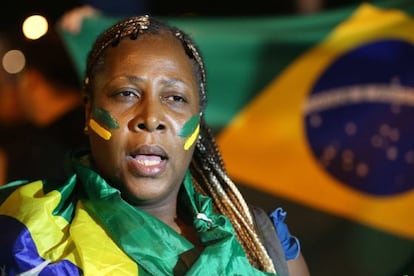Rousseff responds to protests with call for a referendum on social reform
Brazilian president meets with local leaders and organizers of the popular street movement


After 18 days of keeping a low profile while heated protests engulfed Brazil, President Dilma Rousseff on Monday surprised the entire nation by announcing plans to hold a referendum aimed at introducing an ambitious package of reforms to answer the demands aired at massive demonstrations calling for changes.
Rousseff said that a national vote would be geared at changing the Constitution through a constituent assembly but did not offer any specific details of what her series of reforms would include. She did however say that the issues to be covered would include the political system, tax structures, health, education and transportation.
“The streets are telling us that they want citizens, not the privileged economic sector, to come first in this country. The energy that is coming from the streets is greater than any other obstacle. We don’t have to be inert, uncomfortable or divided,” she said. “For that reason I am bringing concrete proposals and a willingness so that we can discuss them in at least five different pacts.”
The announcement was made after Rousseff had held a meeting in Brasilia with the nation’s state governors and the mayors of major cities. She also met with representatives of the Free Pass Movement (MPL), the grassroots organization that played a leading role in organizing the demonstrations. Rousseff also said that the people “want quality public services” and “more effective ways to combat corruption,” while at the same time enjoying “responsive political representation.”
“Brazil is ready to move forward,” the president proclaimed.
The last time Brazil made any significant reforms was 25 years ago when lawmakers ratified the current Constitution in 1988, three years after democracy was restored. Since then there has been much talk about introducing more reforms but any actual proposals have always died out in Congress.
The streets are telling us that they want citizens, not the economic sector, to come first"
Rousseff’s offer comes after hundreds of thousands of Brazilians have taken to the streets in different cities on a nightly basis to demand better services and more representative government. On June 17, some 250,000 people took part in a massive nationwide protest, the biggest mobilization of citizens seen in 20 years.
The protests grew after demonstrations against public transportation hikes were held on June 6.
Most of the demonstrations have been peaceful except for incidents in São Paulo and Rio de Janeiro, where police using tear gas and pepper spray clashed with protestors.
With her proposal to call a constituent assembly to overhaul Brazil’s representative democracy, Rousseff is seemingly attempting to diffuse the wave of protests. But MPL leaders said they had grown tired of the president’s eloquent speeches, which they said were prepared by her consultants to help her image.
The day after Rousseff’s televised speech on Friday — when she made a conciliatory gesture toward the protestors in describing them as defenders of democracy — some 60,000 people in Belo Horizonte came out to demonstrate against the cost to the country of hosting next year’s soccer World Cup. Protestors have also targeted matches being played as part of this month’s Confederations Cup, a smaller international soccer tournament.
On Sunday, at least 20 more marches were held in different cities, although attendance in the majority of these rallies didn’t reach 5,000.
On Monday morning, two women were killed when they were hit by a vehicle as they marched with about 400 others in Cristalina in Goiás state. Since the protests began on June 6, four people have died in the marches.
The MPL has claimed victory in its demands to repeal hikes in public transportation fares. The governments of São Paulo and Rio decided to roll back fares by 20 cents after other cities made similar moves.
Before meeting with Rousseff, São Paulo Governor Geraldo Aickman, a member of the center-right Brazilian Social Democratic Party (PSDB), announced that he was suspending hikes in toll roads through his state for the next year.
Tu suscripción se está usando en otro dispositivo
¿Quieres añadir otro usuario a tu suscripción?
Si continúas leyendo en este dispositivo, no se podrá leer en el otro.
FlechaTu suscripción se está usando en otro dispositivo y solo puedes acceder a EL PAÍS desde un dispositivo a la vez.
Si quieres compartir tu cuenta, cambia tu suscripción a la modalidad Premium, así podrás añadir otro usuario. Cada uno accederá con su propia cuenta de email, lo que os permitirá personalizar vuestra experiencia en EL PAÍS.
¿Tienes una suscripción de empresa? Accede aquí para contratar más cuentas.
En el caso de no saber quién está usando tu cuenta, te recomendamos cambiar tu contraseña aquí.
Si decides continuar compartiendo tu cuenta, este mensaje se mostrará en tu dispositivo y en el de la otra persona que está usando tu cuenta de forma indefinida, afectando a tu experiencia de lectura. Puedes consultar aquí los términos y condiciones de la suscripción digital.








































